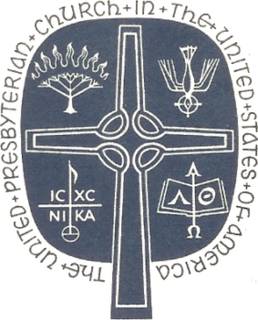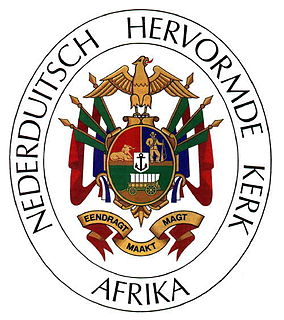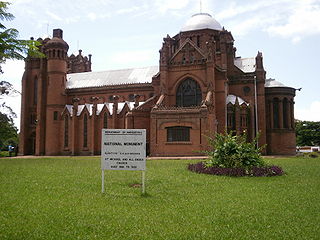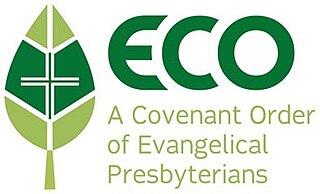
Presbyterianism is a part of the Reformed tradition within Protestantism, which traces its origins to Great Britain, particularly Scotland.

The Presbyterian Church (USA), abbreviated PC(USA), is a mainline Protestant Christian denomination in the United States. A part of the Reformed tradition, it is the largest Presbyterian denomination in the US, and known for its relatively progressive stance on doctrine. The PC(USA) was established by the 1983 merger of the Presbyterian Church in the United States, whose churches were located in the Southern and border states, with the United Presbyterian Church in the United States of America, whose congregations could be found in every state. The similarly named Presbyterian Church in America is a separate denomination whose congregations can also trace their history to the various schisms and mergers of Presbyterian churches in the United States.

The Cumberland Presbyterian Church is a Presbyterian Christian denomination spawned by the Second Great Awakening. In 2015, it had 70,810 members and 709 congregations, of which 51 were located outside of the United States. The word Cumberland comes from the Cumberland River valley where the church was founded.

The United Presbyterian Church in the United States of America (UPCUSA) was the largest branch of Presbyterianism in the United States from May 28, 1958, to 1983. It was formed by the union of the Presbyterian Church in the United States of America (PCUSA), often referred to as the "Northern" Presbyterian Church, with the United Presbyterian Church of North America (UPCNA), a smaller church of Covenanter-Seceder tradition at a conference in downtown Pittsburgh, Pennsylvania, in May 1958. Vigorous ecumenical activity on the part of PCUSA leaders led to this merger, something of a reunion of two long-separated branches of the larger Presbyterian family deriving from the British Isles.

The Evangelical Presbyterian Church (EPC) is an American church body holding to presbyterian governance and Reformed theology, expressed in an orthodox, conservative vein.

The Presbyterian Church in the United States of America (PCUSA) was the first national Presbyterian denomination in the United States, existing from 1789 to 1958. In that year, the PCUSA merged with the United Presbyterian Church of North America, a denomination with roots in the Seceder and Covenanter traditions of Presbyterianism. The new church was named the United Presbyterian Church in the United States of America. It was a predecessor to the contemporary Presbyterian Church (USA).
The Lutheran Church of Central Africa or LCCA is a Christian denomination of the Lutheran tradition based in the African countries of Zambia and Malawi. Currently (2004), it consists of over 40,000 baptized members in 200 congregations spread throughout both countries.

Reformed Churches of New Zealand is a Reformed Christian denomination in New Zealand. The denomination is constituted of 22 member churches, the first seven of which were formed in 1953. Total membership as of 2011 stands at 3,291.
Presbyterian Church of East Africa (PCEA) is a Presbyterian denomination headquartered in Nairobi, Kenya. In Kenya, 10% of the population is Presbyterian. It was started by missionaries from Scotland, most notable of whom was Dr John Arthur. It has its headquarters in Nairobi South C.

The Dutch Reformed Church in Africa is a Reformed Christian denomination based in South Africa. It also has congregations in Namibia, Botswana, Zambia and Zimbabwe. Along with the Dutch Reformed Church in South Africa (NGK) and the Reformed Churches in South Africa, the NHK is one of the three Dutch Reformed sister churches of South Africa.

The Reformed Presbyterian Church of North America (RPCNA) is a Presbyterian church with congregations and missions throughout the United States, Canada, and Japan. Its beliefs—formulated via membership in the Reformed Presbyterian Church and RP Global Alliance—place it in the conservative wing of the Reformed family of Protestant churches. Below the Bible—which is held as divinely inspired and without error—the church is committed to several "subordinate standards," together considered with its constitution: the Westminster Confession of Faith and Larger and Shorter Catechisms, along with its Testimony, Directory for Church Government, the Book of Discipline, and Directory for Worship.

The Presbyterian Church of Brazil is an Evangelical Protestant Christian denomination in Brazil. Oldest of the Reformed family of Protestantism in Brazil. It is the largest Presbyterian denomination in the country, having an estimate 1,011,300 members, 8,315 ordained ministers and 5,015 churches and 5,392 parishes. It is also the only Presbyterian denomination in Brazil present in all 26 States and the Federal District. It was founded by the American missionary Rev. Ashbel Green Simonton, who also oversaw the formal organization of the first congregation and the first Presbytery. Although the Presbyterian Church of Rio de Janeiro was only formally organized in January 1863, and the Brazilian church only left the jurisdiction of the joint missions board of the American churches in 1888, when the Synod was formed, the denomination considers the date of Simonton's arrival in Brazil, August 12, 1859, as its foundation date.
Presbyterian Church of Pakistan is a major Protestant denomination of Pakistan. The Church of Pakistan is another Christian denomination. The Presbyterian Church of Pakistan has a membership of around 400,000 in 340 congregations served by 330 pastors. It was constituted in 1993. It belongs to the World Communion of Reformed Churches as well as to the World Council of Churches, among others. It has schools.
The Presbyterian Church of Nigeria is a Presbyterian church in the Federal Republic of Nigeria and subscribes to the Westminster Confession of Faith.

The Church of Central Africa Presbyterian (CCAP) is a Presbyterian denomination. It consists of five synods: one in Zambia, one in Zimbabwe and three in Malawi – Livingstonia Synod in the north of the country, Nkhoma Synod in the centre, and Blantyre Synod in the south.

ECO: A Covenant Order of Evangelical Presbyterians is an evangelical Presbyterian denomination in the United States. As a Presbyterian church, ECO adheres to Reformed theology and Presbyterian polity. It was established in 2012 by former congregations and members of the Presbyterian Church (USA), abbreviated PC(USA). Dissatisfaction with the declining membership of the PC(USA) along with growing denominational disputes over theology and bureaucracy led to the founding of ECO. ECO has over 380 congregations and over 500 pastors.

The National Presbyterian Church in Mexico is the second-largest Protestant church, and the largest Reformed denomination in Mexico. It is present throughout the country, and is particularly strong in the states of Tabasco, Chiapas, Campeche, Yucatan, Nuevo León, Aguascalientes and Mexico City.
The Presbyterian Church of Africa was founded in 1898 by Rev. James Mzimba, who broke from the Church of Scotland. He was born in Ngquakai, and his father was a deacon in the Presbyterian Church. Mzimba become a pastor, and was ordained in 1875. He was sent to Scotland to the anniversary of the Free Church of Scotland, but later severed its ties with the denomination. In 1899 he founded his own independent Presbyterian church. He died in 1911. The first Synod was constituted in Alice, Cape Colony. Mzambi had a dispute with the Free Church of Scotland over land and over the use of money. The Presbyterian Church of Africa is a predominantly black church. It was a small group of churches with 2 presbyteries. The church grew steadily. It is one of the oldest independent churches in Africa.

The Synod of Livingstonia is a synod of the Church of Central Africa Presbyterian. It was founded by missionaries of the Free Church of Scotland in 1875.














